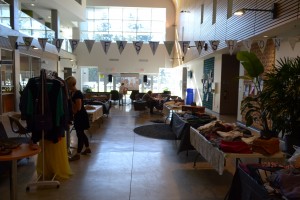By Glen Ess (The Cascade) – Email

Look down at your pants — do you know if they were ethically made? Or made in an environmentally friendly way? If you, like me, didn’t know that fair trade, ethical shopping was a thing, then go talk to UFV’s global development studies club (GDSC). Many of these students were involved in organizing UFV’s first ever holiday market last semester, featuring fair trade crafts from the Fraser Valley, and just this past Thursday they did it again, holding a thrift shop / ethical clothing sale in the atrium of the Student Union Building (SUB).
The event also featured a screening of the documentary The True Cost, which describes in detail just how the “fast fashion” industry affects millions across the globe. Those affected by this boom in the clothing industry aren’t limited to the workers in sweatshops located in the developing world — who are often paid a pittance — but stretches to the environment, as the waste produced by the manufacturing process is linked to soil and river pollution, as well as pesticide contamination of crops near factories.
While the film played, the GDSC set up several tables in the atrium, which they then loaded with clothes donated for their thrift store. With the vast majority of items going for five dollars, it was easy to pick up brand name items for a tenth of their usual cost. However, when more closely examining the purpose behind the event, GDSC members were more than happy to reveal the not-so-pretty truth of the international garment trade.
It’s a sobering thought that buying well-known brands such as Lacoste and Nike can lead to someone walking out of a store having spent at least twice on their purchase what an average sweatshop worker makes in a month (approximately $25).
Hell, even Canadian brands such as Joe Fresh, which is carried by most Loblaw subsidiaries, such as Superstore, pays workers in Bangladeshi factories a wage far below the accepted standard. It was only three years ago that a commercial building, the Rana Plaza in Bangladesh, collapsed, killing 1,129 people. One of the many things housed in the Rana Plaza was a small workshop where Joe Fresh branded items were produced. And while Loblaw’s did sign an international agreement to improve the safety standards of workshops in Bangladesh, they were still being sued as late as April of last year over the incident. And that’s just one example.
Surely then, there has to be some organization out there advocating for fairer, safer, ethical regulation of the garment industry? Well, a quick chat with GDSC members made it clear that yes, there is someone outside of the university working to institute better industry practices: the Maquila Solidarity Network (MSN), the beneficiaries of all funds raised by the GDCS’ thrift store, is a Canadian-based organization with partner groups in Central America, Africa, and Asia, all of whom advocate for improved working conditions and wages, as well as setting up Maquiladora factories. These factories are far more rigorously regulated, and monitor both the environmental impact the factory has as well as the human one.
The MSN has a proven track record of campaigning for companies to move towards a Maquiladora setup, with past campaigns directed towards the likes of La Senza and the Hudson’s Bay Company. Current campaigns focus on Wal-Mart as well as, interestingly enough, the nation of Burma.
But what can a student do to help while the MSN goes toe-to-toe with corporate giants? Unfortunately not much, though the GDSC does show us the way to go: closer scrutinization of where we’re shopping and questioning where, and to whom, the money we spend actually goes.
We need to realize that while a snazzy sweater may cost us an arm and leg, it’s very possible that some unfortunate worker may actually be suffering.


